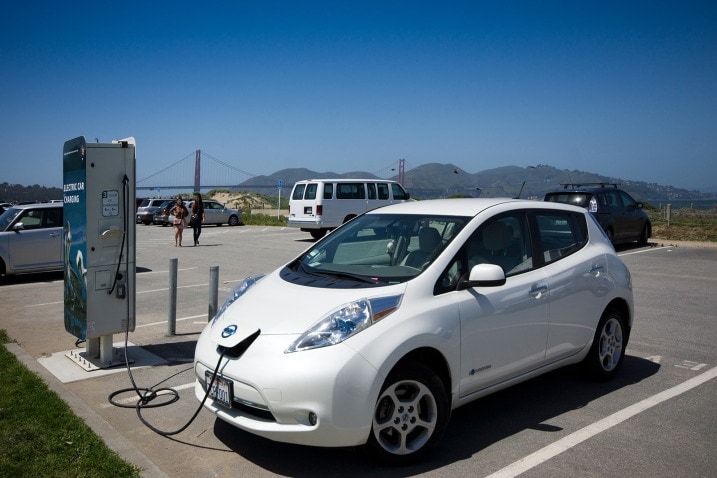PRO: Used EVs tend to be in better condition and require less maintenance. EVs have fewer moving parts than traditional cars, so there isn't a whole lot that can break down. Plus, the major battery components will have an eight- to 10-year warranty (varies by state). And if you want even greater peace of mind, take a look at certified pre-owned electric vehicles (CPO EVs), which come with extra warranty coverage, lower interest rates for financing, and other benefits such as roadside assistance or loaner cars for luxury brands. In general, you might find that used EVs will have fewer miles on the odometer relative to gas-powered cars, which means they've had less wear and tear on the brakes, tires and suspension. This is the silver lining of their more limited range — people often just don't drive them that much.
EVs also require less regular maintenance. Most conventional vehicles call for a major service in the third year, which can often cost a few hundred dollars or more. Compare that to the Nissan Leaf, for example, which requires only a tire rotation and brake fluid and cabin filter replacement in its third year.
PRO: You'll get a smoother driving experience. Since an EV does not have an internal combustion engine, it's smoother and quieter and it vibrates less than a gas-powered vehicle. Affordable conventional cars with four-cylinder engines tend to feel coarse and lack refinement when driven back to back with an EV. Also, the added weight of the EV's battery low in the structure tends to make the car feel more planted on the road.
PRO: They're better for the environment. Unlike a gas-powered car, an EV does not produce tailpipe pollutants that contribute to global warming. If your local power plant uses renewable energy to produce the electricity for your EV, there's no pollution from that source either. Even the assertion that an EV hurts the environment as much as a regular car when it draws electricity from a coal-powered plant has been largely disproven. EVs do have a slightly greater carbon footprint when they are built due to their complexity, but a study from the Union of Concerned Scientists found that "battery electric cars make up for their higher manufacturing emissions within 18 months of driving — shorter-range models can offset the extra emissions within six months — and continue to outperform gasoline cars until the end of their lives." And if you're buying a used electric car, it's already been built, so that's no longer a factor.
PRO: You may have carpool lane access. If you live in a state that allows you to drive an EV solo in the carpool or high-occupancy vehicle (HOV) lane, the lane access stickers are usually transferrable to the next owner. This can be a real game-changer in heavy traffic.
PRO/CON: Bargains are out there, but with a caveat. You'll find that earlier electric vehicles such as the original Nissan Leaf, Ford Focus EV, Kia Soul EV, Chevrolet Spark and Fiat 500e will be less expensive and can make for a bargain commuter car, but there's a reason why those prices tend to be low. The EPA range on those early EVs was typically between 75 and 115 miles when they were new, and the real-world range is likely less now due to battery degradation — more on that below. Most people aren't comfortable with those smaller ranges, especially if you don't have a charger on the other end of your trips, which would effectively cut your range in half. But if you can make peace with the limited range, or have a second car for longer trips, these cars can make for a great daily driver on the cheap.
CON: Possibility of diminished battery performance. Anyone who's owned a battery-powered device has seen its performance fade over time. The same thing can happen to electric vehicles — particularly early models. We'll spare you the chemistry lesson, but suffice it to say that as EV batteries age, you may see reduced performance and range. Driving in high temperatures, charging to maximum capacity, and draining the battery to a low voltage all take their toll. A degraded battery could mean that the EV won't reach the EPA-estimated range it once had. A useful rule of thumb, provided by the vehicle data company Geotab, is that an electric vehicle battery will degrade by 2.3% every year.
Because EVs have a much bigger battery, this performance drop happens much more slowly than it does with a smartphone or a laptop. The EV's battery cooling system is another factor in how it behaves over time: Liquid cooling helps preserve battery life and performance, and many, but not all, EVs have these systems. The Nissan Leaf, for example, has an air-cooled battery.
Battery fade was a vexing issue for some owners of early Nissan Leafs (2011-2012), particularly the ones consistently driven in hot climates. Nissan projected that Leaf batteries would retain 80% of their capacity under typical use after five years. After an investigation into the instances of battery fade in the Phoenix area in 2012, it revised that figure for that region.
"Based on actual vehicle data, we project the average vehicle in that market to have battery capacity of 76 percent after five years — or a few percentage points lower than the global estimate," Carla Bailo, senior vice president, Research and Development for Nissan Americas, said in an open letter to Leaf owners. "Factors that may account for this differential include extreme heat, high speed, high annual mileage, and charging method and frequency of the Nissan Leafs in the Phoenix market," said Bailo.
Nissan reminded its customers that these cars were only a small subset of all the Leaf vehicles in the world, and most Leafs' batteries were aging as intended, with 80% of capacity after five years. Nissan ended up changing its battery chemistry for the 2013 Leaf, which made the battery more resistant to warmer temperatures. The Leaf community has nicknamed it the "lizard" battery.
CON: The charging factor. Do you have a place to charge an EV? Is the plug rated at 240 volts? Is the wiring in your home old? If so, you'll likely need to hire an electrician to prepare your home for an EV. The charging station itself can range from under $200 to more than $1,000 before installation, depending on the brand and features. The installation costs can vary tremendously based on electrician labor rates and the extent of rewiring required. This cost can range from $799 to $1,999, according to Qmerit. If you're on the high end of installation costs, setting up your home for charging could eat away at the potential savings of owning a used EV.
If you plan on making do with public chargers, make sure you look into the pricing for the stations you intend to use. Some stations charge by the hour as opposed to the kilowatt-hour, which can add up over time.
CON: Outdated technology. If you commit to buying a used electric car and keeping it for a few years, you'll have to come to terms with the fact that its key technology may soon become outdated. On the one hand, the software may be missing features like Apple CarPlay and Android Auto, or it may simply be less user-friendly than newer versions. And then there are the range issues with older electric cars, as noted above. The 2015 Nissan Leaf, for example, had an EPA-estimated 87 miles of range. By contrast, the 2022 Leaf has a range of 215 miles with the larger optional battery.
CON: Battery life uncertainties. Modern electric vehicles (dating from around 2011) haven't been out long enough to accurately judge how long their batteries will last. If you're the second buyer, you may not know the car's charging history and the effect that's had on the battery.
If the EV's battery flat-out fails, however, you may have recourse. Even if the car is out of its basic warranty period (typically three years), the battery should still be covered under the federally required warranty: eight years or 80,000 miles. California's zero-emission vehicle regulations require even more coverage. EVs and hybrids sold in California, and the states that have adopted this standard, must carry a minimum 10-year/150,000-mile warranty on their battery systems. As of this date, those states are Connecticut, Colorado, Delaware, Maine, Maryland, Massachusetts, New Jersey, New Mexico, New York, Oregon, Pennsylvania, Rhode Island, Vermont and Washington as well as the District of Columbia.
But not all automakers cover battery degradation, meaning the loss of charging capacity and, subsequently, the loss of driving range in the event that happens. If your car's maker does provide that coverage, capacity loss must fall under a certain threshold to be covered. If the manufacturer doesn't cover capacity loss, the battery must stop functioning altogether for the warranty to kick in.
The general consensus for the lifetime of an EV battery is roughly 10-20 years depending on how it was charged and climatic conditions.
CON: Diminished resale value. Although the used car market is inflated these days, an electric vehicle typically depreciates at a faster rate than a gasoline equivalent. This is partly due to the available federal tax credit of up to $7,500. Why bother with a 1- to 2-year-old EV when you can buy a new one and get the tax credit? That said, there has been an improvement in EV depreciation in recent years. According to Edmunds data, the trade-in values of a 2-year-old Chevrolet Bolt and Nissan Leaf were approximately 52% and 32% of original MSRP, respectively, in 2019. But in 2022, a 2-year-old Bolt has a trade-in value of about 82% of its original MSRP, while the Leaf retains 65% of its MSRP. Still, our data shows that a gas-powered car retains its value better than an electric one, at least for now.
Summing up
Buying and owning an EV makes for a different kind of car experience. EVs have some strong pros and a few cons that you should consider carefully before you buy. But once you resolve how you'll charge it up, the purchase may well make sense. You won't spend a nickel on gas, and if you have the right setup, you won't spend much on charging either. You'll avoid many maintenance and repair costs that confront most used-car owners. In short, you can wring a lot of value out of the car, and over time its resale value may catch up to that of gas-powered vehicles.


 by
by 